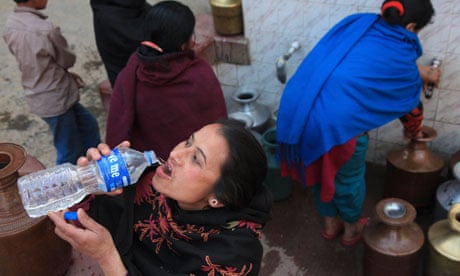Half of the world's population now lives in cities, with 3 million urban arrivals every week. In the next two decades, nearly two-thirds of humanity will be living in cities, delegates at a three-day event held in Cape Town to mark World Water Day (WWD) were told.
This year, WWD is focusing on the provision of water in urban areas.
Over a thousand representatives from more than 30 organisations gathered in South Africa to discuss the urban water challenges and opportunities facing the world today. It is hosted by South Africa, in collaboration with UN-Water, the African Ministers' Council on Water (Amcow), the UN secretary general's Advisory Board on Water and Sanitation (Unsgab), the UN Environment Programme, and the UN Human Settlements Programme (UN-Habitat).
In Africa, where the rate of urbanisation is the world's highest and urban populations are expected to double in the next 20 years, water services have been on the decline since 1990. Amcow highlighted the opportunities provided by the conference for African ministers, mayors, civil society organisations and representatives of development banks and the private sector to discuss how they can move faster and more effectively in closing this gap and achieving millennium development goals. The critical need for collaboration and communication between sectors, and the need for visionary leadership to manage the planet's limited water resources were recurring themes.
Conference sessions covered topics as diverse as how cities can decentralise urban water management systems to make them sustainable, the role of water in urban green growth, and how cities can address sanitation issues in rapidly growing informal settlements and slums. "Urbanisation, a greener world, and coping with climate variability – those are the three issues that just about every session is looking at in some way or another," said Margaret Catley-Carlson, executive board chair of the Global Crop Diversity Trust.
Numerous speakers highlighted the need for a shift away from "old models" of water management and business-as-usual thinking. "I see a transition from people being consumers of water to people being custodians of water. We need to manage water as a flux instead of a stock," said Anthony Turton, director of TouchStone Resources, a natural-resource management company based in South Africa, at a World Bank panel on public-private partnerships.
The privatisation of water supplies has been a controversial issue in the past, sparking protests when attempted in Bolivia and South Africa. Last year, the African Development Bank recommended privatisation as the only way to meet the continent's water and sanitation needs. However, Richard Makolo, leader of the South African Crisis Water Committee, reportedly called privatisation "a new kind of apartheid".
"I think the issue of who owns the utility and who provides the service is much less than it used to be," said Julia Bucknall, sector manager of the central unit for water at the World Bank's Energy, Transport and Water department. "There are some basic fundamentals of good governance of water that need to be respected, independent of who owns them."
One example of a public-private innovation that was given a cautious welcome was that of franchising wastewater treatment plants. Providing a standardised model that breaks down the business processes into a set of clearly defined issues could extend the reach of the limited number of engineers and scientists in developing countries and also would more easily secure financial backing, supporters said.
Not everyone was convinced. A member of the audience from Coca-Cola commented: "When you talk about franchising you're talking about investments. Investment fears uncertainty. When you talk about water as a human right, investors get nervous. The franchise model has been successful in delivering everything from burgers to coke, but it requires a level of certainty to work."
The challenges identified with water itself were uncontroversial – too much, not enough, too dirty, rain falling in the wrong place or at the wrong time – and most conference speakers were optimistic that technological innovations could be found to deal with these. In the end, the real challenges were identified in leadership and implementation. "The urban water challenge must be recognised for what it really is – a crisis of governance, weak policies and poor management, rather than a scarcity crisis," said Unsgab's Prince Willem-Alexander of the Netherlands.
The complexity of the sector was identified both as a challenge and an opportunity to build a world where water, energy, the environment and development are treated as one. "Water does not require just one capacity. Water engineers, chemical engineers, planners, architects, in addition to advocacy, ambassadors, and politicians – we need all of them. You cannot fix water with a single shot. It's a very complex sector that requires a lot of interdependency," said Alioune Badiane, regional director for Africa and the Arab states at UN-Habitat.
"The centrality of water to development is becoming more and more obvious, and this conference shows it," said Bucknall. "Water supply and sanitation are extremely important, but water is also important for energy security, food security and basic urban security. So we're seeing this integrated view of water as a central core development issue emerging more and more."
